One of the most significant events in the history of cryptocurrency is finally expected to happen this week. Ethereum’s major software upgrade, called The Merge, will fully transition the blockchain platform from its current proof-of-work consensus mechanism to the proof-of-stake model. Ethereum is expected to continue on as normal, only now it will be verified using PoS instead of PoW for authenticating crypto transactions.
According to Ethereum.org, “The Merge represents the joining of the existing execution layer of Ethereum (the Mainnet) with its new proof-of-stake consensus layer, the Beacon Chain. It eliminates the need for energy-intensive mining and instead secures the network using stakes ETH.”
The Merge aims to address three main areas of concern: sustainability, scalability and security. The new system not only sets the stage for future scaling upgrades including sharding but also drastically reduces Ethereum’s energy usage by more than 99% because miners will no longer have a financial incentive to run computers around the clock, according to researchers at the Ethereum Foundation.
The transition from proof-of-work to proof-of-stake is also expected to further deliver changes to the NFT market. The Merge has the potential to increase the diversification of Ethereum and revamp the tokenomics of the entire market and potentially see an increase in NFT’s pricing.
The majority of NFTs are part of the Ethereum blockchain, and many people are excited about the transition since it is expected to reduce energy consumption, meaning users will be able to mint and sell NFTs in a more sustainable way. However, with all significant technical upgrades, some users fear there may be the potential for scams, hacks, volatility and confusion.
Are your NFTs safe?
There may be confusion over which assets are “official” or “genuine” since duplicate NFTs will exist due to the ETH proof-of-work chain and other potential forks.
When the merge is complete, at least one proof of work (PoW) fork of Ethereum is expected to live on, potentially creating the risk of creating two versions of NFTs. Thus, NFT owners may face an issue called a ‘replay attack’. This is when a transaction is completed on one blockchain, and repeated on another.
The largest NFT marketplace, OpenSea, and prominent brands like Yuga Labs, the creator of the Bored Ape Yacht Club, have publicly stated they will not support the duplicate versions of…
Click Here to Read the Full Original Article at NewsBTC…
























